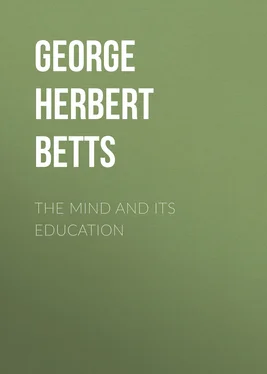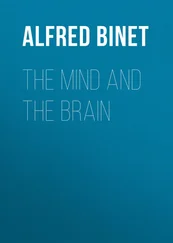George Herbert Betts - The Mind and Its Education
Здесь есть возможность читать онлайн «George Herbert Betts - The Mind and Its Education» — ознакомительный отрывок электронной книги совершенно бесплатно, а после прочтения отрывка купить полную версию. В некоторых случаях можно слушать аудио, скачать через торрент в формате fb2 и присутствует краткое содержание. Жанр: foreign_edu, pedagogy_book, foreign_psychology, на английском языке. Описание произведения, (предисловие) а так же отзывы посетителей доступны на портале библиотеки ЛибКат.
- Название:The Mind and Its Education
- Автор:
- Жанр:
- Год:неизвестен
- ISBN:нет данных
- Рейтинг книги:3 / 5. Голосов: 1
-
Избранное:Добавить в избранное
- Отзывы:
-
Ваша оценка:
- 60
- 1
- 2
- 3
- 4
- 5
The Mind and Its Education: краткое содержание, описание и аннотация
Предлагаем к чтению аннотацию, описание, краткое содержание или предисловие (зависит от того, что написал сам автор книги «The Mind and Its Education»). Если вы не нашли необходимую информацию о книге — напишите в комментариях, мы постараемся отыскать её.
The Mind and Its Education — читать онлайн ознакомительный отрывок
Ниже представлен текст книги, разбитый по страницам. Система сохранения места последней прочитанной страницы, позволяет с удобством читать онлайн бесплатно книгу «The Mind and Its Education», без необходимости каждый раз заново искать на чём Вы остановились. Поставьте закладку, и сможете в любой момент перейти на страницу, на которой закончили чтение.
Интервал:
Закладка:
The Physical Basis of Habit.—Habit is to be explained from the standpoint of its physical basis. Habits are formed because the tissues of our brains are capable of being modified by use, and of so retaining the effects of this modification that the same act is easier of performance each succeeding time. This results in the old act being repeated instead of a new one being selected, and hence the old act is perpetuated.
Even dead and inert matter obeys the same principles in this regard as does living matter. Says M. Leon Dumont: "Everyone knows how a garment, having been worn a certain time, clings to the shape of the body better than when it was new; there has been a change in the tissue, and this change is a new habit of cohesion; a lock works better after having been used some time; at the outset more force was required to overcome certain roughness in the mechanism. The overcoming of this resistance is a phenomenon of habituation. It costs less trouble to fold a paper when it has been folded already. This saving of trouble is due to the essential nature of habit, which brings it about that, to reproduce the effect, a less amount of the outward cause is required. The sounds of a violin improve by use in the hands of an able artist, because the fibers of the wood at last contract habits of vibration conformed to harmonic relations. This is what gives such inestimable value to instruments that have belonged to great masters. Water, in flowing, hollows out for itself a channel, which grows broader and deeper; and, after having ceased to flow, it resumes when it flows again the path traced for itself before. Just so, the impressions of outer objects fashion for themselves in the nervous system more and more appropriate paths, and these vital phenomena recur under similar excitements from without, when they have been interrupted for a certain time." 2 2 Quoted by James, "Psychology," Briefer Course, p. 135.
All Living Tissue Plastic.—What is true of inanimate matter is doubly true of living tissue. The tissues of the human body can be molded into almost any form you choose if taken in time. A child may be placed on his feet at too early an age, and the bones of his legs form the habit of remaining bent. The Flathead Indian binds a board on the skull of his child, and its head forms the habit of remaining flat on the top. Wrong bodily postures produce curvature of the spine, and pernicious modes of dress deform the bones of the chest. The muscles may be trained into the habit of keeping the shoulders straight or letting them droop; those of the back, to keep the body well up on the hips, or to let it sag; those of locomotion, to give us a light, springy step, or to allow a shuffling carriage; those of speech, to give us a clear-cut, accurate articulation, or a careless, halting one; and those of the face, to give us a cheerful cast of countenance, or a glum and morose expression.
Habit a Modification of Brain Tissue.—But the nervous tissue is the most sensitive and easily molded of all bodily tissues. In fact, it is probable that the real habit of our characteristic walk, gesture, or speech resides in the brain, rather than in the muscles which it controls. So delicate is the organization of the brain structure and so unstable its molecules, that even the perfume of the flower, which assails the nose of a child, the song of a bird, which strikes his ear, or the fleeting dream, which lingers but for a second in his sleep, has so modified his brain that it will never again be as if these things had not been experienced. Every sensory current which runs in from the outside world; every motor current which runs out to command a muscle; every thought that we think, has so modified the nerve structure through which it acts, that a tendency remains for a like act to be repeated. Our brain and nervous system is daily being molded into fixed habits of acting by our thoughts and deeds, and thus becomes the automatic register of all we do.
The old Chinese fairy story hits upon a fundamental and vital truth. These celestials tell their children that each child is accompanied by day and by night, every moment of his life, by an invisible fairy, who is provided with a pencil and tablet. It is the duty of this fairy to put down every deed of the child, both good and evil, in an indelible record which will one day rise as a witness against him. So it is in very truth with our brains. The wrong act may have been performed in secret, no living being may ever know that we performed it, and a merciful Providence may forgive it; but the inexorable monitor of our deeds was all the time beside us writing the record, and the history of that act is inscribed forever in the tissues of our brain. It may be repented of bitterly in sackcloth and ashes and be discontinued, but its effects can never be quite effaced; they will remain with us a handicap till our dying day, and in some critical moment in a great emergency we shall be in danger of defeat from that long past and forgotten act.
We Must Form Habits.—We must , then, form habits. It is not at all in our power to say whether we will form habits or not; for, once started, they go on forming themselves by day and night, steadily and relentlessly. Habit is, therefore, one of the great factors to be reckoned with in our lives, and the question becomes not, Shall we form habits? but What habits we shall form. And we have the determining of this question largely in our own power, for habits do not just happen, nor do they come to us ready made. We ourselves make them from day to day through the acts we perform, and in so far as we have control over our acts, in that far we can determine our habits.
2. THE PLACE OF HABIT IN THE ECONOMY OF OUR LIVES
Habit is one of nature's methods of economizing time and effort, while at the same time securing greater skill and efficiency. This is easily seen when it is remembered that habit tends towards automatic action; that is, towards action governed by the lower nerve centers and taking care of itself, so to speak, without the interference of consciousness. Everyone has observed how much easier in the performance and more skillful in its execution is the act, be it playing a piano, painting a picture, or driving a nail, when the movements involved have ceased to be consciously directed and become automatic.
Habit Increases Skill and Efficiency.—Practically all increase in skill, whether physical or mental, depends on our ability to form habits. Habit holds fast to the skill already attained while practice or intelligence makes ready for the next step in advance. Could we not form habits we should improve but little in our way of doing things, no matter how many times we did them over. We should now be obliged to go through the same bungling process of dressing ourselves as when we first learned it as children. Our writing would proceed as awkwardly in the high school as the primary, our eating as adults would be as messy and wide of the mark as when we were infants, and we should miss in a thousand ways the motor skill that now seems so easy and natural. All highly skilled occupations, and those demanding great manual dexterity, likewise depend on our habit-forming power for the accurate and automatic movements required.
So with mental skill. A great portion of the fundamentals of our education must be made automatic—must become matters of habit. We set out to learn the symbols of speech. We hear words and see them on the printed page; associated with these words are meanings, or ideas. Habit binds the word and the idea together, so that to think of the one is to call up the other—and language is learned. We must learn numbers, so we practice the "combinations," and with 4×6, or 3×8 we associate 24. Habit secures this association in our minds, and lo! we soon know our "tables." And so on throughout the whole range of our learning. We learn certain symbols, or facts, or processes, and habit takes hold and renders these automatic so that we can use them freely, easily, and with skill, leaving our thought free for matters that cannot be made automatic. One of our greatest dangers is that we shall not make sufficiently automatic, enough of the necessary foundation material of education. Failing in this, we shall at best be but blunderers intellectually, handicapped because we failed to make proper use of habit in our development.
Читать дальшеИнтервал:
Закладка:
Похожие книги на «The Mind and Its Education»
Представляем Вашему вниманию похожие книги на «The Mind and Its Education» списком для выбора. Мы отобрали схожую по названию и смыслу литературу в надежде предоставить читателям больше вариантов отыскать новые, интересные, ещё непрочитанные произведения.
Обсуждение, отзывы о книге «The Mind and Its Education» и просто собственные мнения читателей. Оставьте ваши комментарии, напишите, что Вы думаете о произведении, его смысле или главных героях. Укажите что конкретно понравилось, а что нет, и почему Вы так считаете.












![Edward Ellis - Adrift on the Pacific - A Boys [sic] Story of the Sea and its Perils](/books/753342/edward-ellis-adrift-on-the-pacific-a-boys-sic-s-thumb.webp)